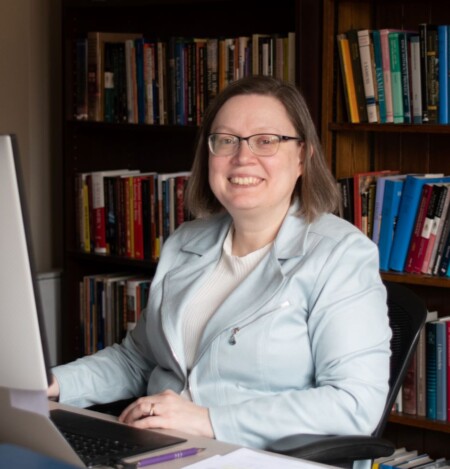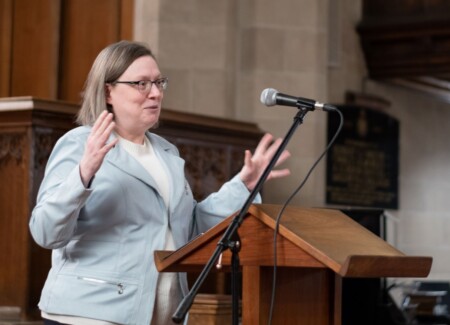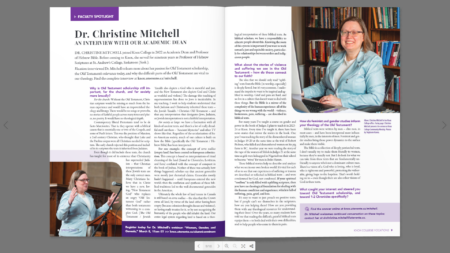An interview with Dr. Christine Mitchell
Dr. Christine Mitchell joined Knox College in 2022 as Academic Dean and Professor of Hebrew Bible. Before coming to Knox, she served for nineteen years as Professor of Hebrew Scriptures at St. Andrew’s College, Saskatoon (Sask.).
Vocations interviewed Christine to learn more about her passion for Old Testament scholarship, the Old Testament’s relevance today, and why the difficult parts of the Old Testament are vital to our theology.
Why is Old Testament scholarship still important, for the church, and for society more broadly?
 For the church: Without the Old Testament, Christian scripture would be missing so much from the human experience and would have an impoverished theology and liturgy. There would be no songs or proverbs, no stories of faithful people across many times and places, no poetry. It would have no theological depth.
For the church: Without the Old Testament, Christian scripture would be missing so much from the human experience and would have an impoverished theology and liturgy. There would be no songs or proverbs, no stories of faithful people across many times and places, no poetry. It would have no theological depth.
Contemporary liberal Protestants tend to be de facto Marcionites. That is, they operate with a biblical canon that is essentially one or two of the Gospels, and some of Paul’s letters. This was the position of Marcion, a 2nd century Christian, who thought that Luke and the Pauline corpus were all Christians needed for scripture. The early church rejected this position and included in its scripture the texts it inherited from Judaism.
Even though it did include these texts, the church has taught for most of its existence that Christianity has superseded Judaism – that Christian interpretations of these Jewish texts are the only correct ones. Many Christians believe that in Christ we have a new, loving, “New Testament God” who replaces an angry “Old Testament God” rather than both testaments witnessing to a complex God. (The Old Testament / Jewish Tanakh also depicts a God who is merciful and just, and the New Testament also depicts God and Christ as wrathful and violent.) The damage this teaching of supersessionism has done to Jews is incalculable. In my teaching, I work to help students understand that both Judaism and Christianity inherited these texts – the Jewish Tanakh / Christian Old Testament – and that any interpretation that denigrates Jews, Judaism, or Jewish interpretation is not a faithful interpretation.
For society at large: we have a fascination with all kinds of ancient texts, and there’s a lot of really dreadful stuff out there – “Ancient Mysteries” and other TV shows like that. Regardless of the secularization of Euro-American society, much of our culture is built on how the Bible (specifically the Old Testament / Hebrew Bible) has been interpreted.
For one example: the concept of terra nullius (empty land) has been central to European colonization. This concept is based on interpretations of ritual cleansing of the land (found in Chronicles, Leviticus, and Ezra) conflated with the concept of conquest in the book of Joshua. Neither of these was actually how things happened; scholars say that ancient genocides were mostly just rhetorical claims. Genocides mostly hadn’t happened – until Europeans entered the new world: then the conflation and synthesis of these biblical traditions led to the well-documented genocides in the Americas.
Ultimately the whole law of land tenure in Canada is still based on terra nullius – the idea that the Crown owns all land, by virtue of the land either having been empty (because colonizers brought disease and violence), or having made treaties for it, or by not recognizing the humanity of the people who did inhabit the land. Our entire legal system regarding land is based on a theological interpretation of these biblical texts. As biblical scholars, we have a responsibility to educate people about this. Knowing the roots of this system is important if you want to work toward a just and equitable society, particularly for relationships between settlers and indigenous people.
What about the stories of violence and suffering we see in the Old Testament – how do those connect to our faith?
The idea that we should only read “uplifting” texts from the Bible (in worship, especially) is deeply flawed, but it’s very common. I understand the impulse to want to be inspired and uplifted in worship. Grief and pain are hard, and we live in a culture that doesn’t want to deal with these things. But the Bible is a mirror of the complexity of the human experience: all of the things we see wrong with the world – violence, brokenness, pain, suffering – are described in biblical texts.
 For many years I’ve taught a course on gender and power in the book of Judges – I plan to teach it in 2023-24 at Knox – and every time I’ve taught it, there have been news stories that mirror the stories in the book. One year I was teaching the story of the dismembered woman in Judges 19-20 at the same time as the trial of Robert Pickton, who killed and dismembered women on his pig farm in BC. Another year we were reading the story of the rape of the women of Shiloh in Judges 21 at the same time as girls were kidnapped in Nigeria from their school to become “wives” for men in Boko Haram.
For many years I’ve taught a course on gender and power in the book of Judges – I plan to teach it in 2023-24 at Knox – and every time I’ve taught it, there have been news stories that mirror the stories in the book. One year I was teaching the story of the dismembered woman in Judges 19-20 at the same time as the trial of Robert Pickton, who killed and dismembered women on his pig farm in BC. Another year we were reading the story of the rape of the women of Shiloh in Judges 21 at the same time as girls were kidnapped in Nigeria from their school to become “wives” for men in Boko Haram.
These biblical stories help us describe and analyze what we see in our own broken world. It’s vital for each of us to see that our experiences of suffering or trauma are described or reflected in biblical texts – and were condemned by God, not condoned. If your spiritual “toolbox” is only filled with uplifting scripture, then you have no theological foundation for dealing with the human condition and experience, which is full of suffering, pain, grief, and loss.
It’s easy to want to just preach on positive texts; but if people can’t see themselves in the scriptures, how are you helping them? How are you providing them with any theological resources for understanding their lives? Over the years, so many students have told me that reading the difficult, painful biblical texts equips them – to both deal with their own difficulties, and to help people who come to them in pain.
How do feminist and gender studies inform your theology of the Old Testament?
Biblical texts were written by men – elite men, in most cases – and have been interpreted most influentially by men, in the interests of men. Feminist and gender studies bring those power dynamics to the surface and make them visible.
The Bible is a collection of deeply patriarchal texts. I don’t usually try to make them friendly to women, because they’re usually not. But I do look for what we can take from these texts that are fundamentally unfriendly to anyone who’s not a dominant-culture man. There’s a vision of a God who is loving, who is loyal, who is righteous and powerful, protecting the vulnerable, giving hope to the hopeless. That’s worth holding on to – even though there are also other visions of God in these texts.
What caught your interest and steered you toward Old Testament scholarship, and toward 1-2 Chronicles specifically?
 When I was about twelve years old, one of the members of our congregation was studying for his MDiv at Emmanuel College. He was a guest in our Sunday School class one week when he was back in town. For some reason he had us read a passage from Deuteronomy – I don’t remember why. But I was hooked. I spent the rest of the class reading through the text and then told everybody what I’d found. After the service, he told my mother that maybe I would be a biblical scholar one day. At the time, I didn’t think much of it. I wanted to be an archaeologist, and I was focused on that field for my entire youth.
When I was about twelve years old, one of the members of our congregation was studying for his MDiv at Emmanuel College. He was a guest in our Sunday School class one week when he was back in town. For some reason he had us read a passage from Deuteronomy – I don’t remember why. But I was hooked. I spent the rest of the class reading through the text and then told everybody what I’d found. After the service, he told my mother that maybe I would be a biblical scholar one day. At the time, I didn’t think much of it. I wanted to be an archaeologist, and I was focused on that field for my entire youth.
I went off to university to study Ancient Near Eastern archaeology, and as part of the program we had to take Hebrew and Aramaic and a couple of biblical studies courses. I discovered that although I loved working in the archaeology lab, dealing with artifacts after they had been excavated, I didn’t love field work – sitting in the sun in the dirt. I also found it more fulfilling to study what people thought, rather than the contents of their trash. I knew I wanted to be a professor, so I went to grad school in religious studies, with a focus on Hebrew Bible (Old Testament). I wrote a master’s thesis on a feminist reading of Jezebel.
Originally for my doctorate, I thought I wanted to work on 1-2 Samuel, because that was what my supervisor worked on. But instead I became intrigued by 1-2 Chronicles. Why? It’s a text that reuses other texts, and therefore creates new meanings and new interpretations of previously-told events.
Although I’ve worked on a few other projects over the last twenty years, I’ve kept coming back to Chronicles. It really is my first love. There are lots of other biblical texts I enjoy reading and writing about, and some others that I enjoy teaching, but nothing quite gets me like Chronicles does. It’s a puzzle that I keep coming back to.
This article appears in Vocations magazine, Spring 2023. Read this article in the magazine online or download the PDF. To subscribe, click here.

